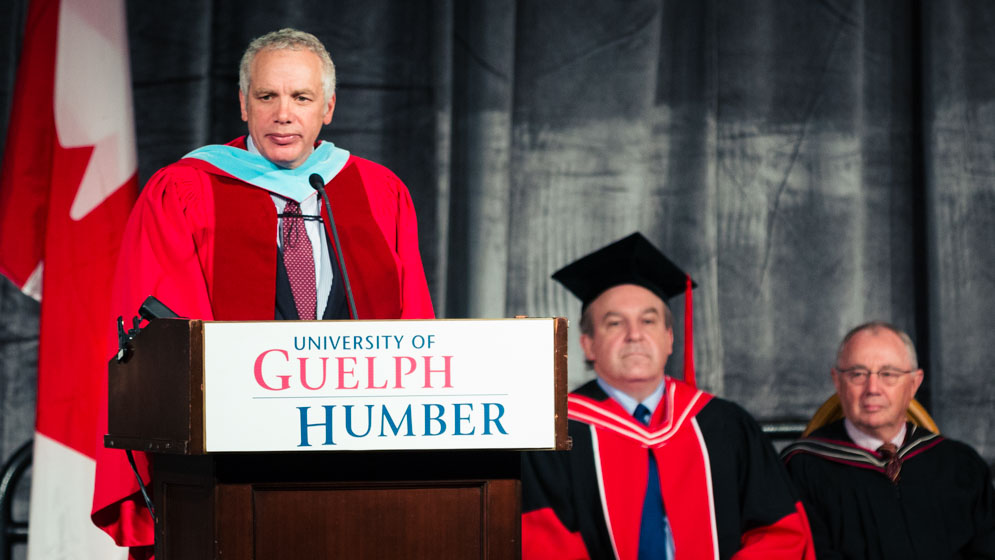- Future Students
- Current Students
- Faculty
- Staff
- Alumni
- Others
There is wealth in principle and in risk, Julian Falconer tells UofGH grads
Top human rights lawyer gives convocation address following conferral of honorary degree
As someone who has spent his life making extraordinary contributions to social justice issues, Julian Falconer urged – actually, implored – UofGH graduates to do the same.
“If you heard my very poor voice singing O Canada you’ll know just how proud I am of this country, and of being Canadian,” he says.
“But at the same time, there are many areas for which pride would not be the first thing that comes to mind in terms of our accomplishments at home.”

Recognized as one of Canada’s top human rights lawyers, Falconer’s more prominent clients have included Maher Arar, who made Canadian legal history in receiving compensation for his wrongful deportation and subsequent torture following 9/11, and the family of 19-year-old Ashley Smith, who died in custody.
He’s acted as counsel for the Aboriginal Legal Services of Toronto, and offers recent statistics on overrepresentation in youth custody facilities:
Since 2003, the incarceration rate for youth has declined across the population – with the exception of Aboriginal and Black youth. While Aboriginal youth occupy 2.9% of the population, they represent five times their proportion in the population. Black youth are represented four times their population.
To UofGH graduates, he offers a response, and an appeal.
“We, as a society, have a number of fears. And our inability to overcome those fears have done us real damage. Our fear of those who are different from us. We continue to think about using the criminal justice system as a tool of social control. As a means for dealing with our mentally ill. We continue to use the criminal justice system as a means for repairing what we did to First Nations out of residential schools. And we continue to use our justice system as a means of managing those who’ve suffered terrible inequities.”
“You will be on the receiving end from what we’ve done. You will have to manage these issues. You will have to have the courage to manage your own fears.”
“There is wealth in principle. There is wealth in risk. I urge you, as our next generation, to go out there. Succeed. And be courageous.”
In recognition of his devotion to the advocacy for human rights and public interest litigation, and for his significant impact on historic legal decisions, Julian Falconer was conferred the degree of Doctor of Laws, honoris causa, at the University of Guelph-Humber’s convocation ceremonies held in June, 2014.
Bio:
Julian Falconer is a Bencher of the Law Society of Upper Canada. A major component of his practice has involved advocacy in human rights and public interest litigation.
He’s acted as counsel for numerous community service organizations including Aboriginal Legal Services of Toronto, Nishnawbe Aski Nation (First Nations government for Northern Ontario), the Association in Defence of the Wrongly Convicted and Urban Alliance on Race Relations. As Counsel for ALST, Julian and his team played a key role in the Ipperwash Inquiry Into the Death of Dudley George.
His more prominent individual clients have included Maher Arar, who made Canadian legal history in receiving the largest human rights settlement allotted to an individual plaintiff; the family of Ashley Smith, the 19-year-old who died in custody at Grand Valley Federal Penitentiary; and Adam Nobody and the “Free Press Four” in relation to their unlawful beatings and arrests during the G20 summit in Toronto.
At the appeal level, Julian’s successful representation of the family of Manish Odhavji (fatally shot in the back by police) resulted in the leading Supreme Court decision on the right of citizens to sue public officials for corrupt conduct.
Julian and his team have represented countless intervenors in human rights cases before the Court of Appeal including the Dee Brown case which led to the recognition for the first time of racial profiling as a legitimate and valid defence for minority communities.
He received his law degree from the University of Alberta and also holds degrees from McGill University and the University of Toronto.

